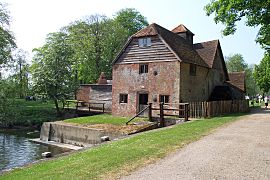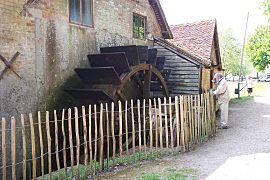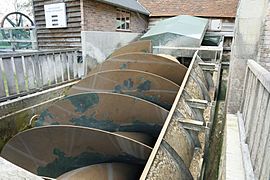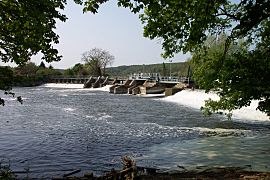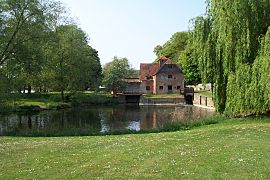Mapledurham Watermill facts for kids
Quick facts for kids Mapledurham Watermill |
|
|---|---|
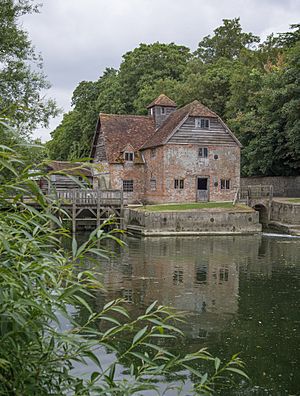 |
|
| Location | Mapledurham, Oxfordshire, England |
| Built | 15th to 19th century |
| Governing body | Mapledurham Estate |
|
Listed Building – Grade II*
|
|
| Official name: The Mill | |
| Designated | 24 October 1951 |
| Reference no. | 1059523 |
| Lua error in Module:Location_map at line 420: attempt to index field 'wikibase' (a nil value). | |
The Mapledurham Watermill is a very old watermill located in Mapledurham, a village in Oxfordshire, England. It gets its power from the River Thames, using the water that flows from the Mapledurham Lock and Weir. This amazing mill was first built in the 1400s. Over the years, it was made bigger in the 1600s, 1700s, and 1800s. Today, it is a special historic building, known as a Grade II* listed building, and it still works!
The mill also has a modern twist. It uses a special machine called an Archimedes' screw turbine to make electricity. This turbine is about 3.6 meters long. It creates enough power to light up about 140 homes. The electricity made here is sold to the main power grid in Great Britain.
Contents
History of Mapledurham Mill
How the Mill Started
There was already a mill at Mapledurham a very long time ago. We know this from the Domesday Book, which was written in 1086. The middle part of the mill you see today was built in the 1400s. Back then, it only had one water wheel on the side facing the river.
Growing Bigger and Busier
In the 1670s, the mill was made larger. A new channel, called a leat, was built. This channel helped power a second water wheel on the side facing the village. This second wheel is the one that is still used today!
Around 1700, the mill was expanded again. This allowed it to make finer flour, which was becoming very popular. In 1777, a barn was added on the mill island. A wharf was also built. This allowed the mill to send flour to London by barge (a type of boat).
Challenges and Restoration
Later, cheap flour started coming in from North America. This made it harder for the mill to make money. Even so, it kept working until just after the Second World War. On October 24, 1951, the watermill was officially named a Grade II* listed building. This means it is a very important historic site. The mill was fixed up and started working again in 1980.
Making Green Energy
In 2011, work began to put in a new Archimedes' screw turbine on the river side of the mill. This turbine was built to make electricity for Mapledurham House. It replaced an older turbine from the 1920s that no longer worked. When the new turbine started in 2012, it was the most powerful one on the River Thames. It was also the biggest of its kind in the country.
In 2022, the mill had some damage from vandalism. Windows were broken and wooden parts were harmed.
Visiting Mapledurham Watermill
How to See the Mill
As of 2025, you can visit the mill as part of a special tour. These tours include Mapledurham House and its gardens. They happen on 11 Wednesday afternoons between April and October. You need to book your tour ahead of time.
The mill is located on the same property as Mapledurham House. When the mill is open, its water wheel is usually working. Visitors can go inside and explore both main floors. You can even feel the mill working!
Getting There
There is a fee to enter the mill. You can buy tickets that let you visit both the house and the mill. You can get to Mapledurham by car. Be aware that the village has a narrow and steep road. Another way to get there is by boat. A boat service runs from Thameside Promenade in Reading on all opening days.
Gallery
See Also
- List of watermills in the United Kingdom
- Museum of Oxford
 | Bayard Rustin |
 | Jeannette Carter |
 | Jeremiah A. Brown |


